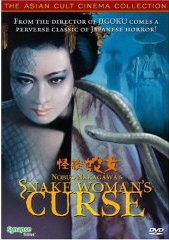
Despite the hordes of self-satisfied critics who have long claimed that the ghost story has seen its day and should make room for newer archetypes, supernatural cinema is just as pertinent now as ever. Supernatural films were treated with as much disdain in the 60s as today, and one of the directors who proved to what extent occult subjects could tantalize and explore serious social issues was director Nobou Nakagawa. Rightfully lauded for Jigikou, his macabre masterwork of bad karma and tragic love, Nakagawa was also responsible for a host of other informative occult fantasies, including the traditionalist supernatural nightmare Mansion of the Ghost Cat and Snake Woman's Curse. The later is a thoughtful, lyrical poem of occult terror and folklore, using traditional symbols to make comments on temptation, guilt, and redemption. Falling somewhere between the philosophical seriousness of Jigikou and sensationalistic atmosphere of Ghost Cat, this moody picture further cements the director's reputation for delivering visionary cinematic terror.
A lush and emotionally intensive symbiosis of traditional folklore and ghost story structural patterns, this story contains occult thrills while evoking troublesome truths about the human condition. In this light it serves as both moral fable and entertainment --- something rare in modern genre storytelling. Chobei Onuma is a wealthy landlord in a rural Asian village who makes life hell for Yasuke, a peasant farmer. When Yasuke kills himself, he leaves behind wife Sue and his daughter Asa. When Chobei informs the two women that they will have to pay off the late man's debts by slaving for him, he makes himself a target of supernatural vengeance. After encountering the ghost of the old farmer and burning down his home to rid it of evil, Chobei's men encounter and kill a snake -- a harbinger of doom in feudal Japan. Meanwhile Chobei, his wife Masae, and their son, Takeo, harass and humiliate Masae and Takeo. Soon Chobei finds himself estranged, sees evil spirits and rotten corpses, and spreads his ill luck throughout his family. Will Chobei survive the curse of the snake woman or will blood call for vengeance in this stylish and well told supernatural thriller?
A reason for fans of Asian horror to celebrate, Snake Woman's Curse is that rare breed of entertainment that falls between art and entertainment, tantalizing and challenging simultaneously. Smart, bold in execution, and gorgeous to look at, this gift from Synapse is perhaps the most historically significant release of the year, further securing a sadly neglected director's achievements in the art of fear. Wonder is just as crucial here,. Instrumental in developing the story and the evocative (creepy!)atmosphere. The imagery employed to announce the power and rage of the supernatural is somberly beautiful, evoking shudders and admiration. Never before released on video in the U.S., this tour through culpability, guilt, and hatred works on both symbolic and personally intimate levels. The story of sin and redemption, and the occult figures used to emphasize them, are universal in scope and significance, working as generalizations for each of our lives. At the same time, and more pertinent to those who simply want to enjoy a good thrill, the internal conflicts and betrayals are indicative of everyday life, making the story and its reverberations just as relevant now as when crafted in the late sixties. Snake works particularly well as an example of traditional Kaidan (Japanese ghost stories), moralistic and truly chilling films that rose goosebumps long before Ringu or Ju-On introduced us to wrathful children or long haired revenants. While these modern examples are fine in their own right, Kaidan such as this are often more concerned with oriental religious principles and adult concerns, often utilizing Japanese folklore and Buddhist principles with greater atmosphere and subtlety. Psychological guilt and personal misgivings often aid the ghosts in wreaking havoc. stories that are brimming with interesting characters, tense atmosphere and karmic revenge.
Synapse offers this fearsome fable by Nobuo Nakagawa, the grandfather of the Japanese horror film, uncut and re-mastered. Snake Woman's Curse is presented in a startlingly clear and fully restored print in anamorphic widescreen. The 2.35:1 aspect ratio is clean and lacking any significant grain -- an achievement indeed considering the rarity and age of the print! The colors are sumptuous, cold and vibrant, spinning a colorful web of nightmare and romance. Audio is just as impressive, including the original Japanese language with newly-translated, removable English subtitles (the later of which are surprisingly literate and pleasant to read).
Extras are plentiful and authoritative, as is to be expected from Synapse. Of these, the most impressive is the "Audio Commentary" by Japanese film scholar Jonathan Hall, who traces the film's evolution, the beliefs behind it, the cultural relevance, and the strengths, life, and techniques of the director. Next is the "Original Japanese Trailer," a "Nobuo Nakagawa biography," and, lastly, a "Poster Gallery." Packaging is even above average, including a reversible cover with original Japanese poster artwork, rounding out this love letter to a genuinely unique effort.
Review by William Simmons
| Released by Synapse |
| Region 1 - NTSC |
| Not Rated |
| Extras : |
| see main review |